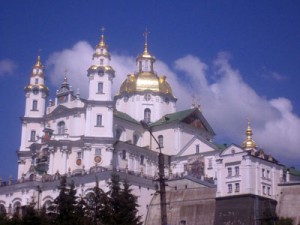 Several months ago, before the oil prices began plummeting, I read an article somewhere that left me confused. It was in a well-respected publication — Foreign Affairs, I believe — and written by a serious author. It claimed that if oil prices go below $25/barrel, Putin’s incredible approval ratings will slip, and the leadership of Russia might change. There were other serious articles in serious publications estimating that number to be $4o or even $5o. As I see it, the logic behind these prognoses was as follows : if the inflow of petrodollars stops, the Russians will lose jobs, earn less, not be able to pay their mortgage etc. People will be angry. And they will aim their anger at Medvedev and Putin, ending their almost unconditional support for them.
Several months ago, before the oil prices began plummeting, I read an article somewhere that left me confused. It was in a well-respected publication — Foreign Affairs, I believe — and written by a serious author. It claimed that if oil prices go below $25/barrel, Putin’s incredible approval ratings will slip, and the leadership of Russia might change. There were other serious articles in serious publications estimating that number to be $4o or even $5o. As I see it, the logic behind these prognoses was as follows : if the inflow of petrodollars stops, the Russians will lose jobs, earn less, not be able to pay their mortgage etc. People will be angry. And they will aim their anger at Medvedev and Putin, ending their almost unconditional support for them.
Now that the oil prices are hovering at $40, it is a good time to analyze these statements and to post factum claim they were incorrect . Oil prices haven’t reached $25/barrel yet, but Russians have been laid off en masse (the unemployment rate went up more than 1% since September, from 5-something% to 6-something%), and there are government agency projections of over 250 thousand more losing their jobs in the first quarter of 2008. Who knows how many more are going to lose their jobs after that? Many companies switched to 4-days workweeks. They cut salaries, and cancelled their employees’ free gym memberships. People are panicking. With the dollar and euro exchange rates going up, it is challenging to find either kind of currency in many provincial cities. Everyone wants to buy foreign currencies to avoid losing much money if the ruble becomes drastically devalued.
Yet, Putin’s approval rating are stellar. And I believe they will remain that way.
Political cycles of the Western world — economy gets worse, the incumbent has fewer chances of getting re-elected, so a new leader steps up, lather, rinse, repeat — do not apply to Russia. The Russians are simply not used to such mode of thinking. Historically, the vast majority of population was in the state of continuous pauperization under the czars. In the USSR, most people were not starving, but not rich, either; they were all equally poor. In the early 90’s, under Yeltsin, food was often rationed. His approval ratings were never impressive, but he did win his second election and had the nation elect the man he hand-picked as his predecessor.
Yeltsin was almost impeached in 1999, only a year after the tough August crisis of 1998. But economic problems were only one of the five charges against him. The impeachment never went through, although it did contribute to Yeltsin eventually resigning. When Yeltsin assumed power, the economy was bad to begin with, and he did not produce any successful or popular reforms. In fact, many people were in doubt whether it was a good idea for the USSR to collapse: breaking up the USSR was another impeachment charge against Yeltsin.
Back then, Russia had an ageing president with serious health and alcohol issues. He had to undergo a seven-hour heart surgery while in the office. To make fun of the videos of him inebriated was a common pastime for stand-up comedians and regular citizens alike. He kept sacking prime ministers and making puzzling decisions, never bothering to explain them to the country. Putin in many ways is the exact opposite. He is athletic, well-dressed, relatively young, and a non-drinker. It easy to assume that someone who is ill and struggles to speak in public and to explain his choices makes poor decision. Likewise, it is easy to trust a control-wielding president who clearly explains his political choices and practices knocking down judo opponents for fun.
But that is not the major difference between Putin and Yeltsin.
Putin gave Russia a direction in which to move. After the USSR collapsed, general population was very confused. In the USSR, people played by the rules, albeit hypocritical and nonsensical ones. In public, one praised the Party; in private, one listened to the Beatles and read books by the dissidents. If one wanted promotion, a new apartment, imported furniture, one knew whom to bribe.
And all of a sudden, it was all over. No one knew what to do, what to say, what to believe in. Even religion, the common last resort at times of upheaval, was foreign and semi-forgotten. The most talented artists, musicians, professionals went to great lengths to immigrate. With fifteen new states, many found themselves having to cross a border to visit friends and family. While some struggled to find morals, some abandoned them altogether and entered the capitalist world of making money.
The charismatic leader who stood on the tank and promised a better future turned out to be as confused as the rest of the population. It was the dark ages of the Russian history, condensed into less than one decade. And then came Putin, and it was a renaissance.
He brought along positive economic changes. Russians began traveling and learning foreign languages. No one had to queue for hours to get regular consumer goods. The gap between the center and the periphery was still drastic, but even the periphery was doing better. The political scientists’ assumption that Putin will stop being so popular is all that is taken away makes sense. But there is something else that Putin achieved.
Russians now know who they are. They take pride on being a strong country that is feared by many states. Nationalism is a way to go. Orthodox Christianity is respected, and churches attract flocks of new believers. To name kids with traditionally Russian names is now a good idea. To memorize the anthem and have a Russian flag is an even better one. Everyone knows in what to believe: Saakashvili needs a sedative, Yuschenko needs a retirement, guest workers need one-way tickets home.
The West finds many of these trends disturbing. But the Russians are not about to give up their new-found identity in exchange for the Western concepts of personal freedoms — that Russia had never had anyway. Putin is a part of that identity, and it would take much more than extra-low oil prices to surgically remove him from it.
There is another ace up Russia’s ruling duo’s sleeves. Since the crises’ first symptoms were diagnosed in the US, the Russian media were successful in equaling the US in general to the root cause of this crisis.”So, how is the US doing? They are guilty of this crisis, aren’t they?” Many Russians feel that the crises is just a continuation of the US’s idée fixe is to destroy Russia.
To be fair, there are articles describing problems with other states’ policies and their contribution to the current global financial crisis, but somehow, they don’t stick with the general population. Anti-American authors and politicians are attracting a lot of attention (check out this Wall Street Journal article about a Russian academic who claims that by 2010, South and North Carolina will be a part of the EU).
This trend of anti-Americanism causes a great deal of the rally effect — people uniting against one enemy. It was successfully used by the post-Soviet states: accuse Russia of all your present troubles, and you got the population supporting you like crazy. Now Russia is using it for its own purposes: to shift the blame to the US, shall if be needed. How can you blame the prime-minister for the crisis, if it the US’s fault anyway?
In 1998, right before the crisis, the government went out of their way to promise nothing really bad would happen to the country’s economy. When the economy collapsed, people felt disappointed and betrayed, just like they did for centuries. Now that the country has leaders who are not afraid to admit 2009 will be difficult, Russians are not about to let go of them.








